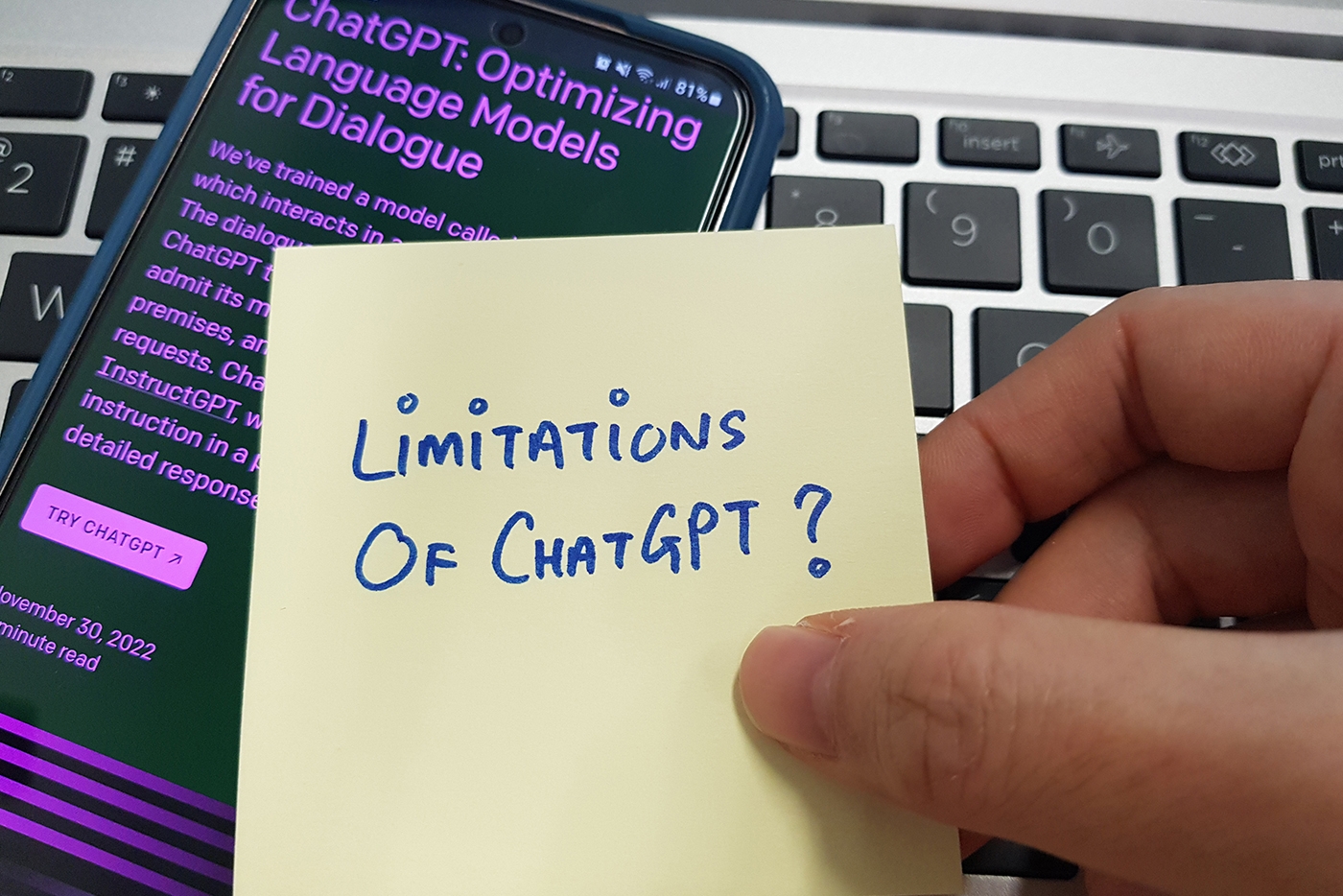The Top 10 Limitations Of ChatGPT
13 March 2023
As an AI language model, ChatGPT is capable of performing a variety of tasks like language translation, writing songs, answering research questions, and even generating computer code. With its impressive abilities, ChatGPT has quickly become a popular tool for various applications, from chatbots to content creation.

But despite its advanced capabilities, ChatGPT is not without limitations. As with any AI technology, ChatGPT has certain weaknesses and challenges that can impact its performance and accuracy.
Here, will explore some of the limitations of ChatGPT, ranging from its inability to understand complex contexts to its reliance on biased data. By understanding the limitations of ChatGPT, we can gain a better understanding of the potential drawbacks and challenges of using AI language models in various contexts.
Lack of common sense: While ChatGPT can generate human-like responses and has access to a large amount of information, it does not possess human-level common sense — and the model also lacks the background knowledge we have. This means that ChatGPT may sometimes provide nonsensical or inaccurate responses to certain questions or situations.
Lack of emotional intelligence: While ChatGPT can generate responses that seem empathetic, it does not possess true emotional intelligence. It cannot detect subtle emotional cues or respond appropriately to complex emotional situations.
Limitations in understanding context: ChatGPT has difficulty understanding context, especially sarcasm and humor. While ChatGPT is proficient in language processing, it can struggle to grasp the subtle nuances of human communication. For example, if a user were to use sarcasm or humor in their message, ChatGPT may fail to pick up on the intended meaning and instead provide a response that is inappropriate or irrelevant.
Trouble generating long-form, structured content: At this time, ChatGPT has some trouble generating long-form structured content. While the model is capable of creating coherent and grammatically correct sentences, it may struggle to produce lengthy pieces of content that follow a particular structure, format, or narrative. As a result, ChatGPT is currently best suited for generating shorter pieces of content like summaries, bullet points, or brief explanations.
Limitations in handling multiple tasks at the same time: The model performs best when it’s given a single task or objective to focus on. If you ask ChatGPT to perform multiple tasks at once, it will struggle to prioritize them, which will lead to a decrease in effectiveness and accuracy.
Potentially biased responses: ChatGPT is trained on a large set of text data — and that data may contain biases or prejudices. This means the AI may sometimes generate responses that are unintentionally biased or discriminatory.
Limited knowledge: Although ChatGPT has access to a large amount of information, it is not able to access all of the knowledge that humans have. It may not be able to answer questions about very specific or niche topics, and it may not be aware of recent developments or changes in certain fields.
Accuracy problems or grammatical issues: ChatGPT's sensitivity to typos, grammatical errors, and misspellings is limited at the moment. The model may also produce responses that are technically correct but may not be entirely accurate in terms of context or relevance. This limitation can be particularly challenging when processing complex or specialized information, where accuracy and precision are crucial. You should always take steps to verify the information ChatGPT generates.
Need for fine-tuning: If you need to use ChatGPT for very specific use cases, you may need to fine-tune the model to get what you need. Fine-tuning involves training the model on a specific set of data to optimize its performance for a particular task or objective, and can be time-consuming and resource-intensive.
Computational costs and power: ChatGPT is a highly complex and sophisticated AI language model that requires substantial computational resources to operate efficiently — which means running the model can be expensive and may require access to specialized hardware and software systems. Additionally, running ChatGPT on low-end hardware or systems with limited computational power can result in slower processing times, reduced accuracy, and other performance issues. Organizations should carefully consider their computational resources and capabilities before using ChatGPT.
This field is developing fast — OpenAI is currently developing a new version of ChatGPT that is likely to be released later this year.
Related Articles
The 12 Best Smart Home Devices Transforming Homes in 2025
By now, “smart” versions exist of just about every home appliance, gadget and gizmos we can think of. However, manufacturers continue[...]
11 Most Reliable AI Content Detectors: Your Guide To Spotting Synthetic Media
Since the launch of ChatGPT just two years ago, the volume of synthetic – or fake – content online has increased exponentially.[...]
The AI-Powered Citizen Revolution: How Every Employee Is Becoming A Technology Creator
Something remarkable is happening in organizations around the world.[...]
6 Mistakes IT Teams Are Guaranteed To Make In 2025
The next wave of artificial intelligence isn't just knocking at enterprise doors - it's exposing fundamental flaws in how organizations approach technology transformation.[...]
2025’s Tech Forecast: The Consumer Innovations That Will Matter Most
Consumer technology covers all of the tech we buy to make our lives more convenient, productive or fun.[...]
7 Healthcare Trends That Will Transform Medicine In 2025
Healthcare has evolved dramatically in recent years, with technology driving countless new opportunities, just as demographic and societal factors have created new challenges.[...]
Sign up to Stay in Touch!
Bernard Marr is a world-renowned futurist, influencer and thought leader in the fields of business and technology, with a passion for using technology for the good of humanity.
He is a best-selling author of over 20 books, writes a regular column for Forbes and advises and coaches many of the world’s best-known organisations.
He has a combined following of 4 million people across his social media channels and newsletters and was ranked by LinkedIn as one of the top 5 business influencers in the world.
Bernard’s latest book is ‘Generative AI in Practice’.










Social Media